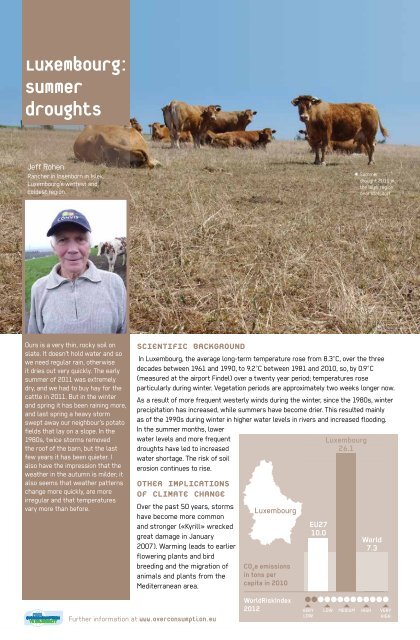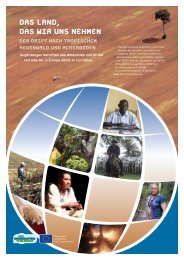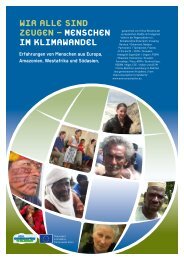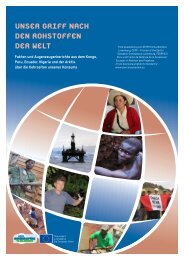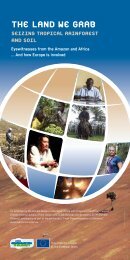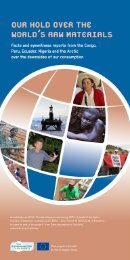WE ARE ALL WITNESSES - PEOPLE IN A CHANGING CLIMATE
The 24 panels of the "We are all witnesses - People in a Changing Climate" exhibition illustrate how climate change is already taking place in 16 countries in four countries.
The 24 panels of the "We are all witnesses - People in a Changing Climate" exhibition illustrate how climate change is already taking place in 16 countries in four countries.
You also want an ePaper? Increase the reach of your titles
YUMPU automatically turns print PDFs into web optimized ePapers that Google loves.
Luxembourg:<br />
Summer<br />
droughts<br />
Jeff Rohen<br />
Rancher in Insenborn in Islek,<br />
Luxembourg’s wettest and<br />
coldest region.<br />
Summer<br />
drought 2011 in<br />
the Islek region<br />
near Walsdorf<br />
© Dietmar Mirkes, ASTM / CA Luxembourg<br />
© Guy Lambert, Walsdorf<br />
Ours is a very thin, rocky soil on<br />
slate. It doesn’t hold water and so<br />
we need regular rain, otherwise<br />
it dries out very quickly. The early<br />
summer of 2011 was extremely<br />
dry, and we had to buy hay for the<br />
cattle in 2011. But in the winter<br />
and spring it has been raining more,<br />
and last spring a heavy storm<br />
swept away our neighbour’s potato<br />
fields that lay on a slope. In the<br />
1980s, twice storms removed<br />
the roof of the barn, but the last<br />
few years it has been quieter. I<br />
also have the impression that the<br />
weather in the autumn is milder; it<br />
also seems that weather patterns<br />
change more quickly, are more<br />
irregular and that temperatures<br />
vary more than before.<br />
SCIENTIFIC BACKGROUND<br />
In Luxembourg, the average long-term temperature rose from 8.3°C, over the three<br />
decades between 1961 and 1990, to 9.2°C between 1981 and 2010, so, by 0.9°C<br />
(measured at the airport Findel) over a twenty year period; temperatures rose<br />
particularly during winter. Vegetation periods are approximately two weeks longer now.<br />
As a result of more frequent westerly winds during the winter, since the 1980s, winter<br />
precipitation has increased, while summers have become drier. This resulted mainly<br />
as of the 1990s during winter in higher water levels in rivers and increased flooding.<br />
In the summer months, lower<br />
water levels and more frequent<br />
droughts have led to increased<br />
water shortage. The risk of soil<br />
erosion continues to rise.<br />
OTHER IMPLICATIONS<br />
OF <strong>CLIMATE</strong> CHANGE<br />
Over the past 50 years, storms<br />
have become more common<br />
and stronger («Kyrill» wrecked<br />
great damage in January<br />
2007). Warming leads to earlier<br />
flowering plants and bird<br />
breeding and the migration of<br />
animals and plants from the<br />
Mediterranean area.<br />
Further information at www.overconsumption.eu<br />
Luxembourg<br />
CO 2<br />
e emissions<br />
in tons per<br />
capita in 2010<br />
15<br />
14<br />
13<br />
12<br />
11<br />
10<br />
9<br />
8<br />
7<br />
6<br />
5<br />
4<br />
3<br />
2<br />
1<br />
0<br />
WorldRiskIndex<br />
2012 VERY<br />
LOW<br />
EU27<br />
10.0<br />
Luxembourg<br />
26.1<br />
World<br />
7.3<br />
LOW MEDIUM HIGH VERY<br />
HIGH


